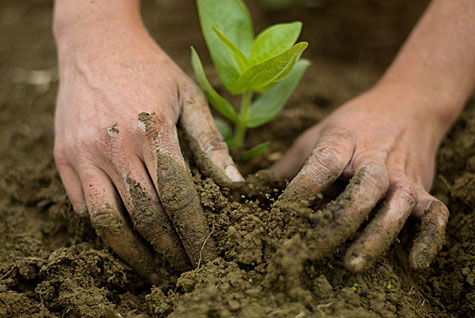 IT'S THE FARMERS They make Portland's food so very good. |
It wasn't always that Portland was "America's foodiest small town." We became this officially when Bon Appetit's October 2009 issue described us this way to its audience of 1,426,992 (give or take) food lovers across the nation. Just 10 years ago, when there were a handful of "foodie" enclaves, no one could have imagined the proliferation to come. Sam Hayward and Rob Evans would each take home the James Beard Award for Best Chef Northeast. The Commissary and the Portland Public Market would come and go, but more would come: Vignola, 555, Cinque Terre, Hugo's, Salt Exchange, Grace, Farmer's Table, Bar Lola, Caiola's, Blue Spoon, Local 188, Evangeline, Bresca, Miyake . . .
Clearly we owe the explosion of great food in our town to the chefs themselves. The ones you've heard of and the ones you haven't. Courtney Loreg has logged something like 25,960 hours in the kitchens of greater Portland. That includes the culinary craftsmanship that has made us swoon at Fore Street and now Bresca, but also cleaning putrid grease traps, scrubbing the low boy, taking loads of trash out, hauling bus-tubs of potatoes, and working so fast and hard it makes the body and head hurt. It's a reality that no reality show covers, and without the lure of a cash prize of $100,000. (A line cook in fine dining might make $11 an hour.)
And where would we be without local farmers and what Sam Hayward calls Maine's "extremely fabulous raw materials"? Hundreds of farmers regularly arrive at the back doors of Portland's kitchens, farmers' markets, and CSA pick-up spots, piling up boxes of their fragrant harvest: the freshest, best-tasting ingredients in the world.
And because one organization has helped 599 farmers find affordable farmland to work with, we owe thanks to Maine Farmland Trust. Here's what they do. Imagine a Maine farm: farm house, fields, open sky. Right in front of that farm, next to the road, is a sign that says, "FOR SALE, 90 ACRES." How many young farmers do you know who are in position to make a million-dollar real estate deal? Maine Farmland Trust helps farmland get into the hands of farmers, not big box stores or housing developments. They've saved 15,000 acres so far.
Loreg remembers when Fore Street was listed in Gourmet as one of the best 50 restaurants in the nation. The bar suddenly was full of people waiting for tables, and the diners weren't getting up from theirs. In the following years, the number of new restaurants Portland could support grew wildly. If this is any indication for what will happen in the decade after Bon Appetit's story we should ask ourselves if Maine will have enough local product. "There's no shortage of fine chefs who know what to do with it," says Hayward. "Access to land will be the issue." In the next 10 years, Maine Farmland Trust estimates that 400,000 acres of farmland will go up for sale. If you'd like it to get into farmers' hands, donate what you can or become a member for $30 atwww.mainefarmland.org. Don't we owe it to them?
Lindsay Sterling can be reached at lindsay@lindsaysterling.com.